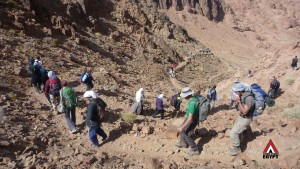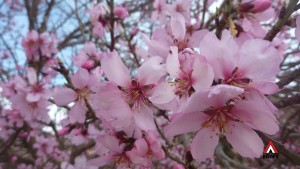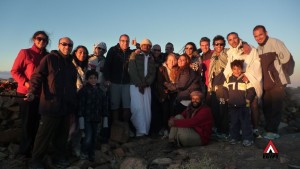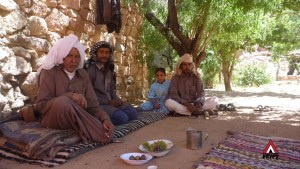 Mountain challenges are growing in popularity. They can have many positive impacts. They help introduce a broader cross section of people to outdoor tourism. They boost local economies and create new jobs and opportunities. At the same time, they introduce new pressures; social and environmental. There’s a long way to go before Egypt’s mountains receive the kinds of visitor numbers that would be cause for alarm; nevertheless, numbers are rising and still have the capacity to create a negative impact. Hikers must do all they can to keep their presence as low-impact, sensitive and positive as possible. Always remember the community objectives of this trail and to behave responsibly and ethically at all times.
Mountain challenges are growing in popularity. They can have many positive impacts. They help introduce a broader cross section of people to outdoor tourism. They boost local economies and create new jobs and opportunities. At the same time, they introduce new pressures; social and environmental. There’s a long way to go before Egypt’s mountains receive the kinds of visitor numbers that would be cause for alarm; nevertheless, numbers are rising and still have the capacity to create a negative impact. Hikers must do all they can to keep their presence as low-impact, sensitive and positive as possible. Always remember the community objectives of this trail and to behave responsibly and ethically at all times.
Please remember Egypt’s beautiful great outdoors – and its welcoming communities – are precious and must be treated with the greatest respect and care.
ENVIRONMENTAL IMPACT
 The Sinai mountains are a unique, high altitude environment, home to rare, endemic plants, butterflies and mammals, some of which are critically endangered. This environment is key to the Bedouin community; they have lived by the land, using its water, plants and resources for everyday life, and may still do today. Remember the Bedouin will feel the negative impact of hikers long after hikers have gone home. Hikers tread a land still vital to local livelihoods and it’s essential to tread lightly, remembering those who’ll use it later.
The Sinai mountains are a unique, high altitude environment, home to rare, endemic plants, butterflies and mammals, some of which are critically endangered. This environment is key to the Bedouin community; they have lived by the land, using its water, plants and resources for everyday life, and may still do today. Remember the Bedouin will feel the negative impact of hikers long after hikers have gone home. Hikers tread a land still vital to local livelihoods and it’s essential to tread lightly, remembering those who’ll use it later.
WATER – Drinking sources are dotted along the route. Keep these absolutely pristine; never wash hands, pots or pans in them, brush teeth in them etc. Please don’t dip/ submerge bottles. Use the tin can by the source to collect water and pour it into bottles.
PLANTS – These are a key part of the local ecosystem. Herbivores graze on them, insects live in them and the local Bedouin use them for food, drinks and medicine. Never pick plants or pull them up for firewood. Even if they look dry and dead, they’re probably just dormant until the rains arrive. A small gas stove is better than wood for making fires.
LITTER – Egypt has a huge problem with litter. Never drop litter. If you see litter, set an example and pick it up. Flammable litter can be burned, but carry everything else out. You can avoid creating some litter by stripping excess packaging before you hit the trail.
FIRES – The Bedouin use dead wood to make small fires but it’s becoming scarce in popular hiking areas. Carry a small gas stove; these are available in Cairo and are quick, convenient and time-efficient to use on a challenge.
TOILET – Usually, you’ll have to find a spot in the mountains. Go at least 100m from the nearest water source and bury excrement. If you use toilet paper, burn it on the spot or carry it out to the town in a sealed plastic bag.
TRAILS – Always stick to trails. Don’t cut corners, or short-cut between the main legs of the path. This damages path lines and leads to serious erosion, which is time-intensive and expensive to reverse. Take care not to trample plants as well.
SOCIAL IMPACT
 Tourism can be a force for positive development. All too often though – at least in the Sinai – it’s not. And especially not for its local Bedouin communities. The bulk of tourism investment has been funnelled into big business hotels in resorts like Sharm el Sheikh, Taba and Dahab. Bedouin tribes from interior parts of the peninsula see little of the vast profits made in the lands they consider to belong to them by ancestral right. Hiking is a way of bringing tourism to these areas and supporting the survival of traditional Bedouin skills and knowledge.
Tourism can be a force for positive development. All too often though – at least in the Sinai – it’s not. And especially not for its local Bedouin communities. The bulk of tourism investment has been funnelled into big business hotels in resorts like Sharm el Sheikh, Taba and Dahab. Bedouin tribes from interior parts of the peninsula see little of the vast profits made in the lands they consider to belong to them by ancestral right. Hiking is a way of bringing tourism to these areas and supporting the survival of traditional Bedouin skills and knowledge.
SPREAD THE WEALTH – Doing the Three Peaks Egypt Challenge and visiting the Sinai’s interior, you’re already making a difference. You’re spreading wealth away from resorts into comparatively little-known places, which receive less business.
SUPPORT LOCAL BUSINESS – Seek out true, locally owned businesses, like Bedouin camps, and use them. Mountain Rose is an excellent local start up using produce from St Katherine’s Bedouin orchards to make hiking superfoods. Supporting local businesses puts money directly in the pockets of local people, encouraging them to keep going. Local people are the ones who give an area its true character and preserve its traditions.
ENCOURAGE LOCAL TRADES – Traditional Bedouin skills are being forgotten, as they become irrelevant to modern life. Support them by creating an economic incentive for their preservation; employ a Bedouin herbalist, a tracker, to buy local handicrafts etc.
CULTURAL IMPACT
 Back in the 1960s, the population of South Sinai was about 5000 people, mostly Bedouin. In 2003, it had risen to over 100,000. It continues to grow. Nile Valley Egyptians outnumber the Bedouin in modern Sinai and Westerners have a year round presence too. Bedouin culture is more exposed to outside influence than ever and it’s changing fast today. Hiking is a form of tourism that supports the preservation of mountain knowledge and skills, which set the Bedouin apart from anybody else.
Back in the 1960s, the population of South Sinai was about 5000 people, mostly Bedouin. In 2003, it had risen to over 100,000. It continues to grow. Nile Valley Egyptians outnumber the Bedouin in modern Sinai and Westerners have a year round presence too. Bedouin culture is more exposed to outside influence than ever and it’s changing fast today. Hiking is a form of tourism that supports the preservation of mountain knowledge and skills, which set the Bedouin apart from anybody else.
ENCOURAGE LOCAL PRIDE – Taking an interest in local Bedouin culture breeds pride. Tell people when you find something interesting or inspiring, in traditional culture, as it helps underline its value and importance. Ask questions about the mountains, place names and everything else, as this helps keep this knowledge relevant and in circulation. Today, much of the knowledge about the mountains is being lost.
DRESS WITH SENSITIVITY – Bedouin culture is conservative and men and women cover most of their bodies. Dress sensitively on trail, even if it’s less comfortable. Men and women should wear trousers, not shorts.
AIM TO UNDERSTAND – The Middle East is different to the West. Don’t assume one is better. Ask questions, listen, and try to understand why things are different. And as much as the differences, remember the deep ties between the Middle East and the West, from religion, to culture and more. These regions have many things in common too.


